Features
Human factors are responsible for a number of key environmental and species declines today, but has it always been the case?
Oxford University researchers have published a comment piece in the journal Science asking this very question in relation to dwindling megaherbivore populations on the African continent (species of mammals that weigh more than 1000kg, such as Elephants, Giraffes and large Hippos).
In the article, Dr René Bobe a Research Associate at Oxford’s School of Anthropology & Museum Ethnography, and Dr Susana Carvalho, Associate Professor in Palaeoanthropology and a Fellow of St Hugh's College, offer a perspective on a paper featured in the same issue which suggests that human ancestors have played no role in the demise of these animals.
However, in their perspective the two challenge this perception and suggest that addressing the question of when humans or our ancestors begin to play a role in driving the largest mammals to extinction is key to determining any fault, whether direct or indirect.
Dr Bobe explains: ‘The article by Faith et al. detects the beginning of megaherbivore decline by 4.5 million years ago, at a time when our evolutionary ancestors were unlikely to have played a role. However, our perspective indicates that there are important gaps in our knowledge of early human ecology, and that species like Homo erectus may have played an indirect role in changing the landscape and triggering extinctions.’
Dr Carvalho adds: ‘There are other factors to consider in what was undoubtedly a complex process: What was the role of fires in changing the landscapes of human ancestors and the animals that lived with them? Did predation patterns change during times of drought to have a major effect herbivore species that reproduce slowly and have a long life span? When did humans begin to hunt very large species?’
In conclusion, the piece finds that the role that humans and our ancestors may have played in driving the largest African mammals to extinction remains an open question.
By Leah Thompson
You would think that by the time you have done four events like this, that you would be cool, calm and collected, and ready for anything. But of course, being entrepreneurial means that you are constantly tinkering and trying to improve the format . . . meaning that nothing is ever quite the same. This event was no different. . . you spend half the time worrying that no one will show up, and the other half of the time worrying that everyone will show up!
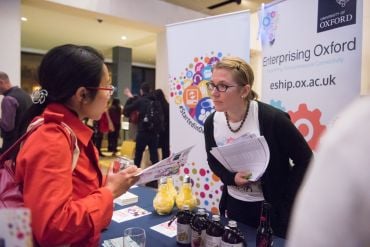 Demo Night 2018
Demo Night 2018Credit: John Cairns
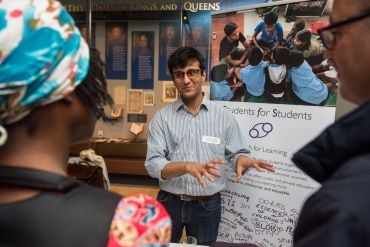 Demo Night 2018
Demo Night 2018By John Cairns
Each attendee was given 1000 #StartedinOxford dollars to "invest" in the startup they liked the most. It was a great way to encourage the attendees to find out as much as they could about each venture. After a welcoming introduction by Pro-Vice Chancellor (Research) at the University of Oxford, Professor Patrick Grant, the attendees were left to explore the hall, and to meet as many exhibitors as possible in the short time. The ventures focused on everything from food, health, accessibility and shopping, to better cultural exchanges, data collection and creativity – using a massive range of innovative solutions. In addition, there was a whole host of entrepreneurship support including The Careers Service, Begbroke Science Park, the Bioescalator, MPLS Enterprise and the Oxford Foundry, as well as external organisations such as the Oxford Hub, Oxfordshire LEP and Oxford Brookes Enterprise.
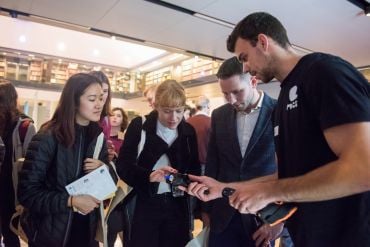 Demo Night 2018
Demo Night 2018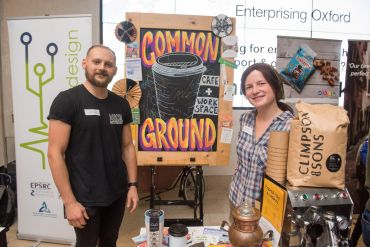 Demo Night winners Common Ground
Demo Night winners Common GroundCredit: John Cairns
What made this evening so much fun was the relaxed atmosphere, and the ability of the attendees to speak directly with the startups. Each person could directly ask questions, and interact with the teams, making it very personable and enjoyable.
A huge thank you to all the startups, our sponsors, the fabulous volunteers, and of course everyone who came and made the event a success!
Leah Thompson (pictured at the top of the blog) is a Project Officer in the Knowledge Exchange and Impact Team, in Research Services. She leads on Enterprising Oxford, a University of Oxford programme to connect and support entrepreneurship in the University and wider Oxford area.
Kwame Dawes, a leading voice in African and Caribbean poetry, has been appointed Visiting Professor at TORCH (The Oxford Research Centre in the Humanities).
Dawes is Chancellor’s Professor of English at the University of Nebraska-Lincoln, the Glenna Luschei Editor of the literary magazine Prairie Schooner, and a chancellor of the Academy of American Poets.
His many honours include the Forward Poetry Prize for Best First Collection, a Guggenheim Fellowship for Poetry, the Musgrave Silver Medal for contribution to the Arts in Jamaica, the Poets & Writers Barnes and Noble Writers for Writers Award, and a Pushcart Prize. In 2009 he won an Emmy Award for Live, Love, Hope, a multimedia performance poetry and music piece that explores the lives of people living with HIV AIDS in Jamaica.
His works of poetry, fiction, plays, and criticism include City of Bones: A Testament (2017), Duppy Conqueror: New and Selected Poems (2013); Bivouac (2010); She’s Gone (2007); A Far Cry from Plymouth Rock: A Personal Narrative (2006); and Bob Marley: Lyrical Genius (2003). He is co-founder and programming director of the biannual Calabash International Literary Festival in Jamaica, and founding director of the African Poetry Book Fund, which advances the development and publication of the poetic arts of Africa.
During his residency in Oxford in November 2018, Professor Dawes will launch an interactive exhibition that tells the story of the first five years of the African Poetry Book Fund, showing all that the fund has accomplished in its promotion and advancement of African poetry worldwide. The exhibit has been curated by Professor Lorna Dawes of the University of Nebraska-Lincoln and features the work of award-winning artist Walter Kitundi.
Professor Dawes will meet with students, scholars, teachers, and members of the local community in Oxford to talk about African and Caribbean poetry and literary criticism, university and school curricula, and ways to encourage, support, and promote marginalised voices in poetry. He said: ‘I look forward to the chance to have fruitful conversations about what I believe are exciting times for poetry, especially poetry from Africa. Technology, advanced communication and the challenges of a global worldview present us with challenges and great opportunities. My hope is to bring a holistic view to the discussion of the poetry of Africa.’
Elleke Boehmer, Professor of World Literature in English at the University of Oxford, who is hosting Professor Dawes, said: ‘TORCH is delighted to host Kwame Dawes on our Humanities and Identities programme. Professor Dawes is a true global intellectual with wide-ranging interests in the world literatures of the Caribbean, African America, and sub-Saharan Africa. He is currently involved in a history-making project to digitise African poetry past and present and bring this rich archive to global attention in ways that will traverse linguistic and cultural borders and draw in transnational communities of readers.’
Dr Katherine Collins, Leverhulme Early Career Fellow at the Department of Education at Oxford, who is co-hosting the residency with Professor Boehmer, said: ‘Professor Dawes is often called “the busiest man in literature” and we are thrilled he is going to be with us this month. His creativity across a range of different forms, and his ability to communicate his messages to an astonishing breadth of audiences, will make a significant contribution to ongoing discussions between scholars, teachers, and community activists on important issues of representation.’
TORCH Director Professor Philip Bullock said: ‘Kwame Dawes brings a unique perspective to bear on TORCH's Humanities and Identities programme, and reminds us of the crucial role played by art and creativity in the cultivation of a responsive moral imagination.’
The TORCH Humanities and Identities Programme is funded by the Andrew W. Mellon Foundation.
A new team of tour guides welcomed their first visitors at the Museum of the History of Science on Oxford’s Broad Street last week.
The volunteers, who have recently arrived in the city as forced migrants from countries including Syria and Iraq, will be running guided tours in Arabic of the museum’s famous collection of Islamic astronomical instruments.
The tours are part of Multaka-Oxford, a project at the Museum of the History of Science and the Pitt Rivers Museum, which creates volunteer opportunities in the museums and uses the collections as a meeting point to bring people together.
Multaka – which means meeting point in Arabic – aims to bring different perspectives to the presentation and interpretation of objects in two collections: Islamic Astronomical Instruments, and Textiles from the Arab World – recently donated by Jenny Balfour-Paul. It also offers people who have recently arrived in the UK the opportunity to practise their English, learn new skills and gain work experience.
Funded by the Esmée Fairbairn Collections Fund, and working in partnership with local community organisations including Asylum Welcome, Connection Support and Refugee Resource, the two-year project currently has a team of 26 volunteers, who have recently arrived from Syria, Iraq, Egypt, Zimbabwe, Sudan and Oman.
At the Museum of the History of Science, volunteer guides will deliver tours in Arabic, starting on 16 November at Oxford’s Christmas Light Festival. At the Pitt Rivers, volunteers will deliver tours from 2019 and will help select and label objects for a new exhibition, Textiles from the Arab World, which is due to open next April. Volunteers at both museums are also actively involved in collections research and documentation, organising events, writing a project blog and managing social media.
Multaka-Oxford builds on a long-standing partnership between the museums and local community organisations and groups. “Over the past seven years we’ve developed a good understanding of the role museums can play in supporting social inclusion and how we can collaborate with local organisations to support communities across Oxford,” says Nicola Bird, Project Manager for Multaka-Oxford.
Inspired by an award-winning project which has been running across four Berlin museums since 2015, Multaka: Museum as Meeting Point, the Oxford team have been working closely with their Berlin counterparts to create places where people can meet, share their experiences, knowledge and skills with each other.
Key to the success of the project has been a focus on what skills and experience the volunteers can bring and what they want to gain: an opportunity to learn and practise English, understand a new working culture, build self-confidence, meet new people and integrate into the local community.
'The project not only offers practical support such as on-the-job training, but also personal support such as providing a sense of inclusion,' says Nicola.
'We were delighted and happy when we found our heritage in Oxford,' says Abdullah Mohamad Alkhalaf, one of the volunteers. 'You gave us confidence in the practice of language and we are not just refugees but people working in their second homeland.'
Insulin is only half the story in what goes awry in diabetes...
More than 400 million people worldwide suffer from type 2 diabetes, a disease characterised by increased blood glucose levels, because the body’s normal way of controlling insulin release breaks down.
But insulin is only one half of the story about what goes wrong in type 2 diabetes: the release of another hormone called glucagon, which has an opposite effect to insulin, is also disrupted in type 2 diabetes.
Now a study led by Professor Patrik Rorsman from the Radcliffe Department of Medicine has found that exposure to high glucose levels for as little as 48 hours changes glucagon secretion from the pancreas – but there may be a way to reverse these effects to restore normalcy.
The study, published in the journal Cell Metabolism, used mice that had been genetically altered to mimic the symptoms of type 2 diabetes, as well as cells from the pancreas’ ‘islets’, donated by patients with type 2 diabetes.
‘Unique cells’
Endocrine cells, such as the alpha cells in the pancreatic islets, are excitable cells that can generate electrical pulses (known as action potentials), much like cells in the brain. Alpha cells and other pancreatic islet cells use these electrical signals to control the release of islet hormones (which include both insulin and glucagon). By studying the electrical behaviour of the alpha cells, Professor Rorsman’s research group (based at the Oxford Centre for Diabetes, Endocrinology and Medicine) hopes to understand how glucagon secretion is regulated.
“We actually use electrophysiology methods similar to those used by neuroscientists to record from these cells” said Dr Quan Zhang, one of the study co-authors.
‘There are only about 1g of pancreatic islets in the body and only 10% of these are alpha cells, so it’s quite a painstaking process to find and study them,” said Professor Rorsman. “Our group has really specialised in studying these cells, and we’ve probably studied more of these cells than any other group in the world!”
These alpha cells release a hormone called glucagon, which helps the liver to convert its store of glycogen into glucose, which then gets released into the bloodstream. The result is more glucose in the blood.
Insulin, which is also released by the pancreas, has the opposite effect: it signals the body to absorb glucose from the bloodstream, resulting in less glucose in the blood.
Normally, high levels of glucose result in pancreatic beta cells releasing insulin, so that glucose levels go down, and low levels of glucose result in the pancreatic alpha cells releasing glucagon, so that glucose levels go up.
“But this fine balance gets entirely disrupted in type 2 diabetes,” said Dr Jakob Knudsen, the first author of the study . “In type 2 diabetes, high glucose levels instead spur pancreatic alpha cells to release even more glucagon, which just makes glucose levels spike even higher.”
Blocking the cascade
But what is actually going wrong in alpha cells to produce this strange response? The research team studied this by tracking what happens to alpha cells exposed to high levels of glucose, using mice that had been bred to have changes similar to those experienced by patients with type 2 diabetes.
The team compared what happened in diabetic versus normal alpha cells, and found that exposure to high glucose levels for as little as 24 hours set off a complex cascade of cellular processes that led to more sodium being ‘pushed’ into the alpha cells.
This lowered the cells’ pH, which results in lower energy being available to the cell. The lower energy levels change the activity of an energy sensitive channel in the cell membrane, and ultimately result in the glucagon release going awry.
But crucially, the researchers were able to reverse too much glucagon secretion in both the cells and the mice by using a drug that stopped too much sodium from getting into alpha cells, thus blocking the chain of events that led to glucagon dysregulation right at the start.
High levels of glucose leave a mark
However, high levels of glucose still left their mark: overweight diabetic rats who had bariatric weight reduction surgery (similar to humans) or successful diabetes drug treatment still had protein changes in alpha cells caused by high levels of glucose - even after their glucose levels returned to normal. What’s more, these protein changes weren’t restricted to the pancreas: the researchers found similar changes in heart and kidney cells in diabetic mice, even when their glucose levels had returned to normal.
“We’re still understanding the complex interplay that leads to diabetes, but we’re hoping that drugs that inhibit these protein changes might be one way of treating the disease,” said Professor Rorsman. “Indeed, we already know that some drugs with inhibit the ‘transporter’ through which sodium gets into alpha cells have had a positive effect in diabetes in animals – we think we now know why.”
“It is fascinating that something with such a small mass as the alpha cells, can have such a large impact on human health” said Dr Knudsen “We think that understanding the regulation of these cells both in healthy and diabetic individuals will improve our understanding of diabetes and provide new avenues of treatment for this growing patient population”.
- ‹ previous
- 59 of 248
- next ›

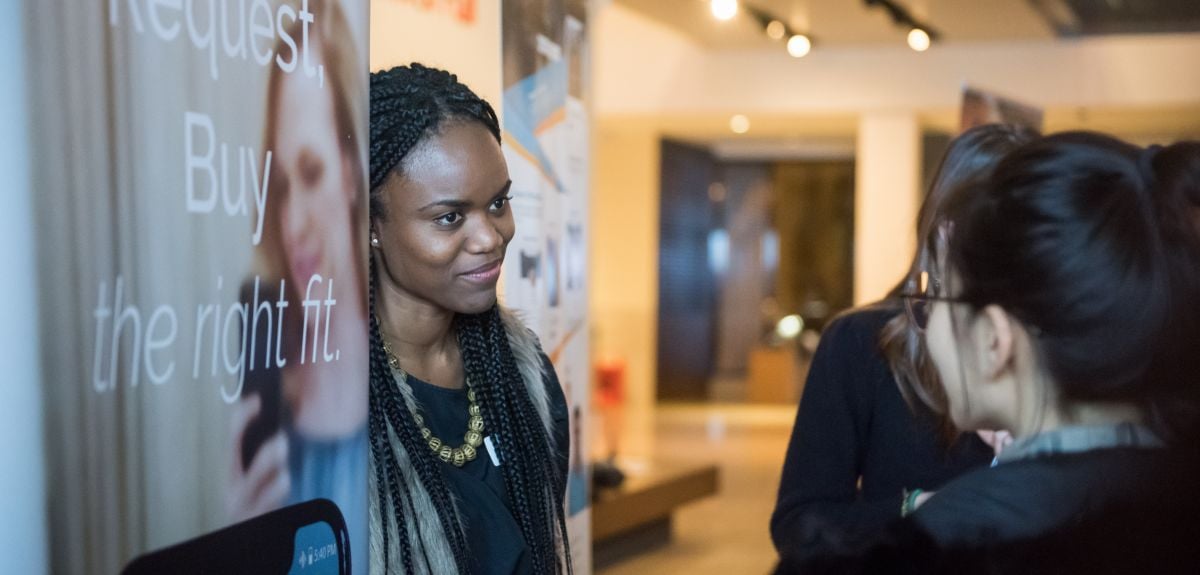
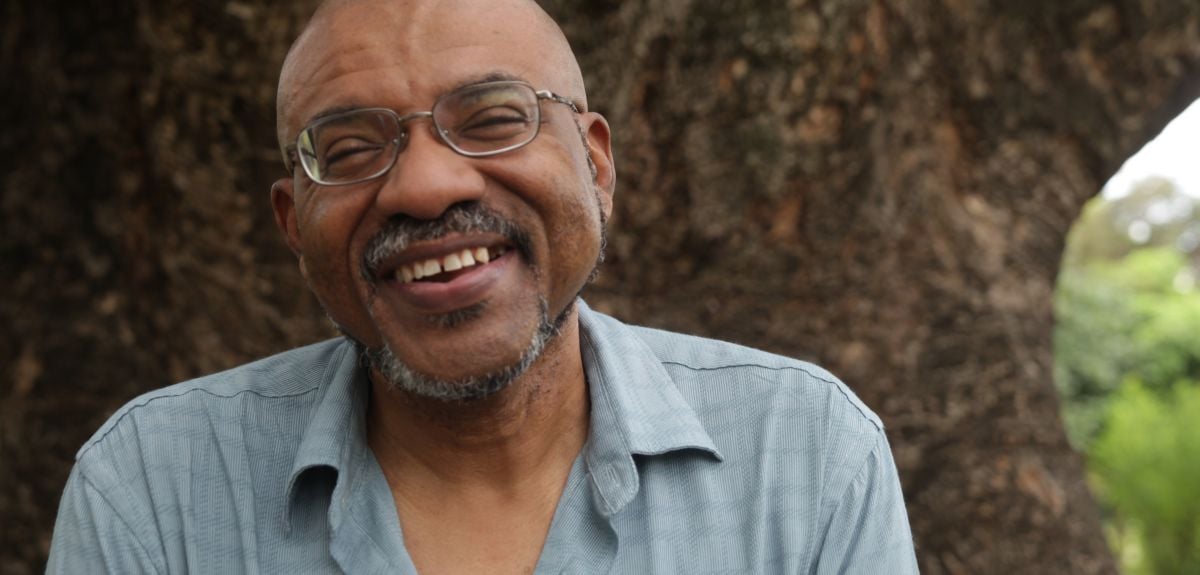
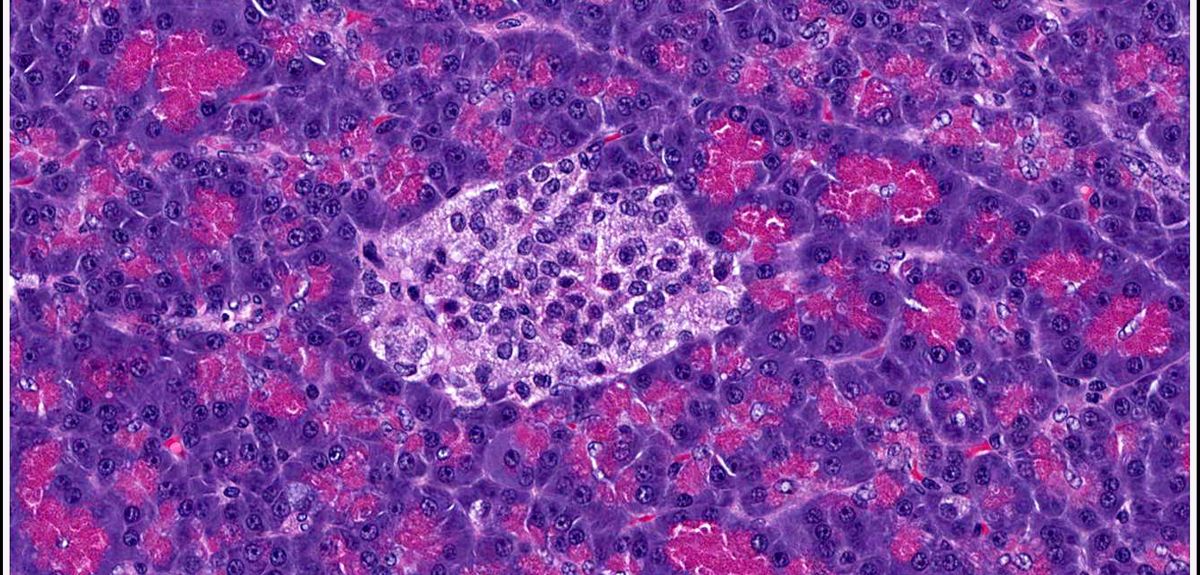
 Teaching the World’s Future Leaders
Teaching the World’s Future Leaders  A blueprint for sustainability: Building new circular battery economies to power the future
A blueprint for sustainability: Building new circular battery economies to power the future Oxford citizen science project helps improve detection of antibiotic resistance
Oxford citizen science project helps improve detection of antibiotic resistance The Oxford students at the forefront of the fight against microbial resistance
The Oxford students at the forefront of the fight against microbial resistance  The hidden cost of AI: In conversation with Professor Mark Graham
The hidden cost of AI: In conversation with Professor Mark Graham  Astrophoria Foundation Year: Dr Jo Begbie reflects on the programme’s first year
Astrophoria Foundation Year: Dr Jo Begbie reflects on the programme’s first year World Malaria Day 2024: an interview with Professor Philippe Guerin
World Malaria Day 2024: an interview with Professor Philippe Guerin From health policies to clinical practice, research on mental and brain health influences many areas of public life
From health policies to clinical practice, research on mental and brain health influences many areas of public life From research to action: How the Young Lives project is helping to protect girls from child marriage
From research to action: How the Young Lives project is helping to protect girls from child marriage